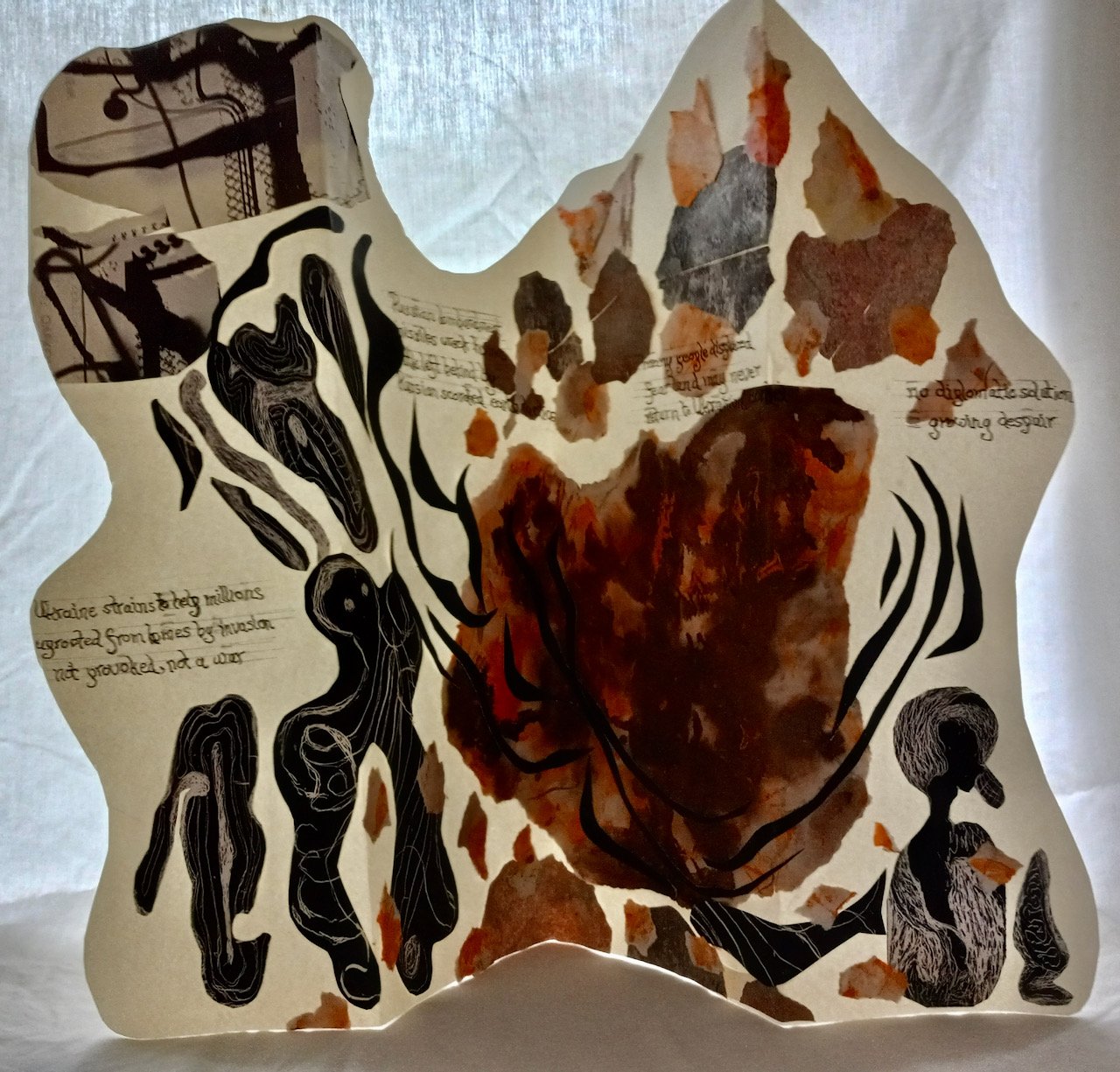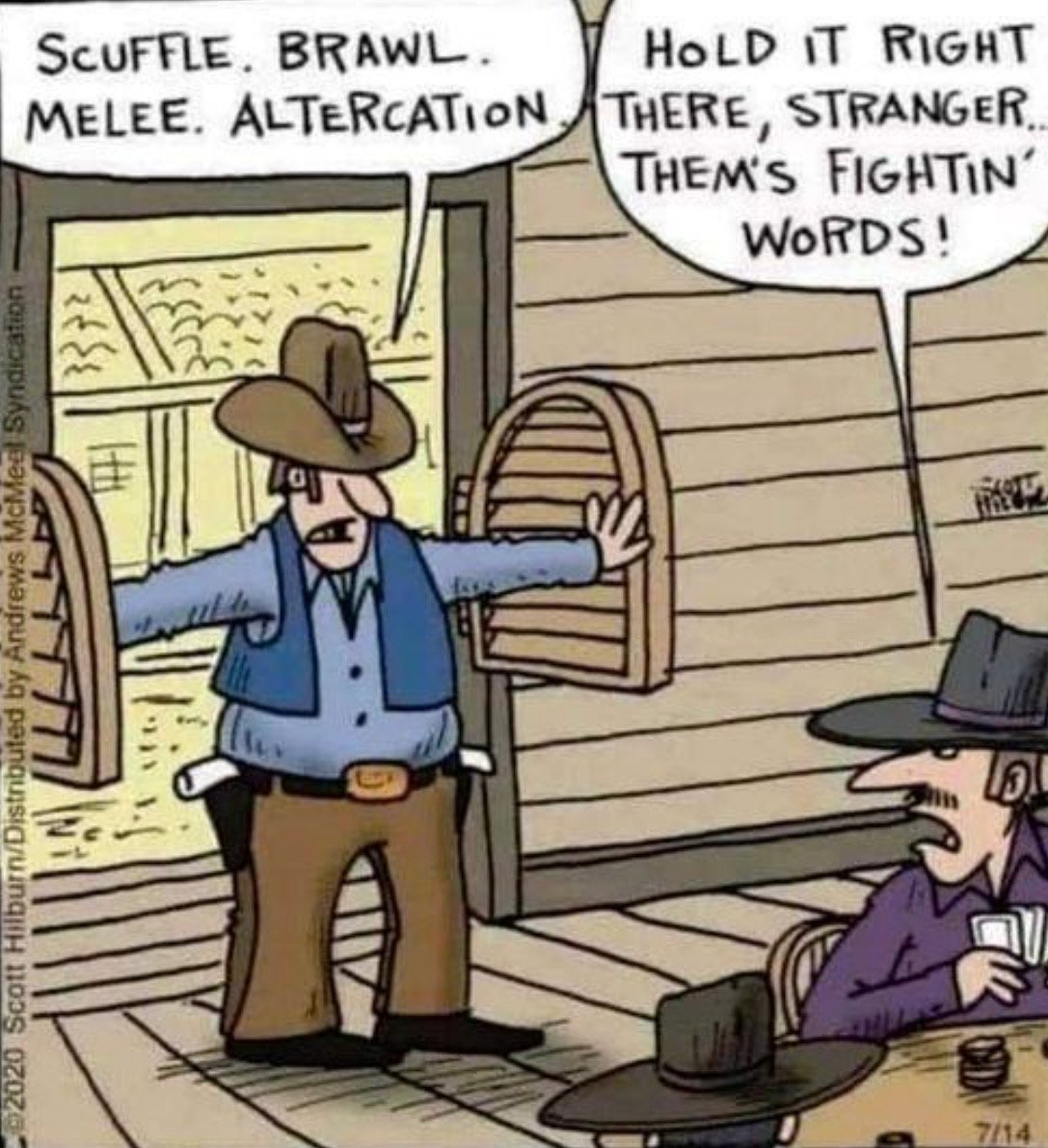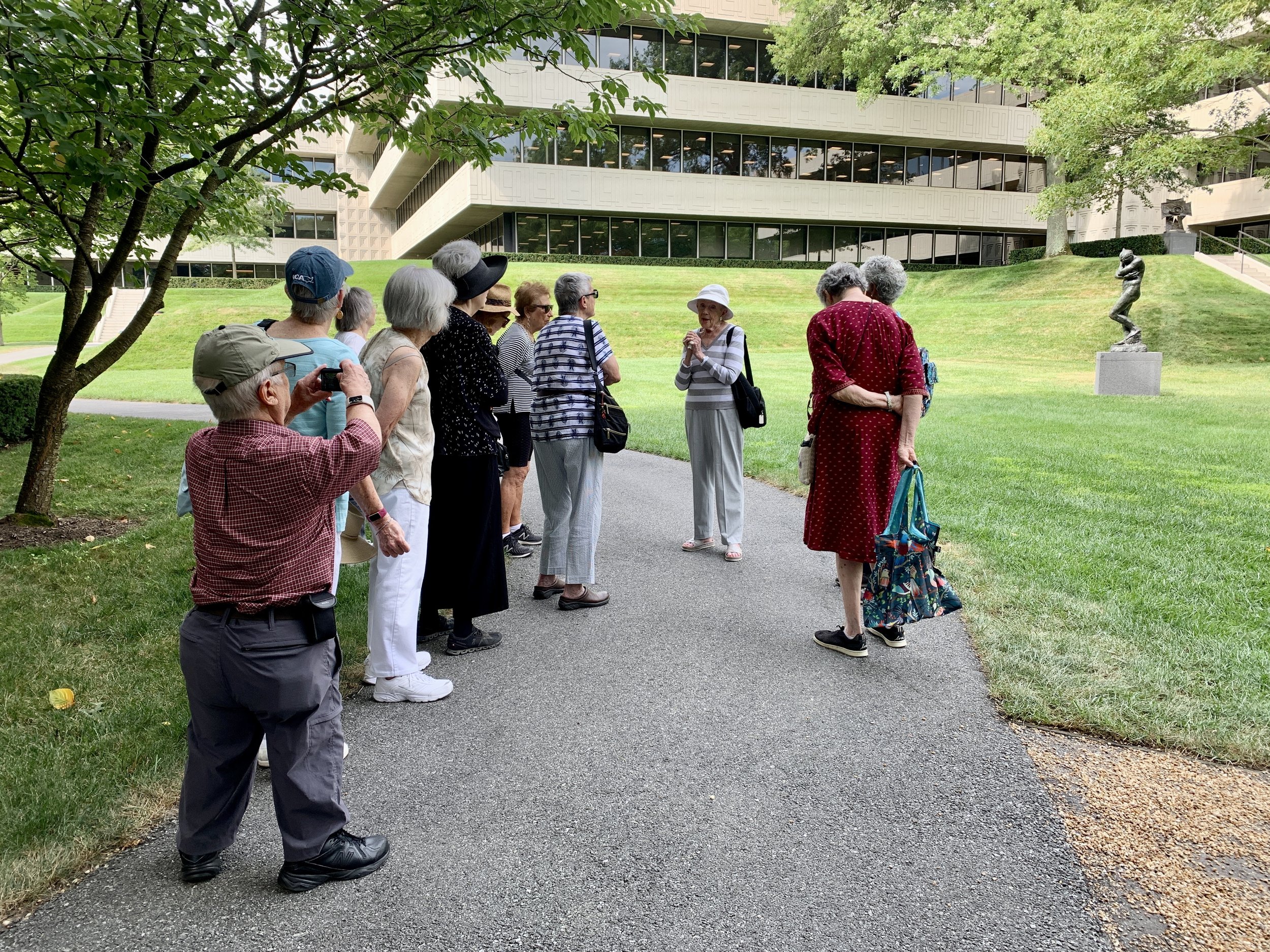Photo by Margo Berger
Sheila Benedis' "Russian Invasion of Ukraine" Artist Book
Art and photo by Sheila Benedis
Art Show in Hastings Sept. 16 includes KoH artist Jane Hart
All are invited to the opening party.
Bee Visiting a Datura Flower in Philipsburg Manor
Photo by Harry Bloomfeld
Art by Hart: Uncle Darwin's stories were interesting but little Pippa would be late for preschool
If You Enjoy Word Play…
Thanks to Sally Kellock for sending these.
View from Her Room in Clearwater
Photo by Sally Costa
Spotted in Rockefeller State Park Preserve Aug. 21
Photo by Pam Mitchell
Butterfly on the KoH Terrace
Photo by Joe Bruno
Rockwood Mushroom Fantasy
Photo by Edward Kasinec
Tree Apparel by Sheila Benedis-- Art and Poem
Art, photo, and poem by Sheila Benedis
Tree Apparel
I write Trees Apparel poem
I relate tree’s apparel
Its leaves
To tree’s true feelings
In all four seasons
The tree feels power and glory
In winter’s nakedness
Proudly shows off its structure
As spring descends
Radiant flower blooming
Still content
Minimal covering of authentic life
Descends into summer darkness
With full leaf cover
Lost its life force
Revives in the fall
After a brilliant show of color
Happily sheds its leaves
Brings armature back to life
underground network of roots
for sharing and communication
trees social beings
positive effect on our emotions
The armature of the tree in winter
is the bones of my sculpture
I’m trying to capture the
Tree’s true essence in my art
The tree has a powerful voice
a symbol of my identity as an artist
my inner voice speaks
it celebrates my life’s work
Art by Hart: Clara Could Manage a Lot of Different Things at Once
Art and photo by Jane Hart
Courtroom Humor from Simone Thornber
These are from a book called "Disorder in Court" and are things people actually said, word for word, taken down and published by court reporters that had the responsibility of staying calm while the exchanges were taking place.
ATTORNEY: What was the first thing your husband said to you that morning?
WITNESS: He said, 'Where am I, Cathy?'
ATTORNEY: And why did that upset you?
WITNESS: My name is Susan!
______________________________
ATTORNEY: What gear were you in at the moment of the impact?
WITNESS: Gucci sweats and Reeboks.
______________________________
ATTORNEY: Are you sexually active?
WITNESS: No, I just lie there.
______________________________
ATTORNEY: What is your date of birth?
WITNESS: July 18th.
ATTORNEY: What year?
WITNESS: Every year.
______________________________
ATTORNEY: How old is your son, the one living with you?
WITNESS: Thirty-eight or thirty-five, I can't remember which.
ATTORNEY: How long has he lived with you?
WITNESS: Forty-five years.
______________________________
ATTORNEY: This myasthenia gravis, does it affect your memory at all?
WITNESS: Yes.
ATTORNEY: And in what ways does it affect your memory?
WITNESS: I forget.
ATTORNEY: You forget? Can you give us an example of something you forgot?
______________________________
ATTORNEY: Now doctor, isn't it true that when a person dies in his sleep, he doesn't know about it until the next morning?
WITNESS: Did you actually pass the bar exam?
______________________________
ATTORNEY: The youngest son, the 20-year-old, how old is he?
WITNESS: He's 20, very close to your IQ.
______________________________
ATTORNEY: She had three children, right?
WITNESS: Yes.
ATTORNEY: How many were boys?
WITNESS: None.
ATTORNEY: Were there any girls?
WITNESS: Your Honor, I need a different attorney. Can I get a new attorney?
______________________________
ATTORNEY: How was your first marriage terminated?
WITNESS: By death.
ATTORNEY: And by whose death was it terminated?
WITNESS: Take a guess.
______________________________
ATTORNEY: Can you describe the individual?
WITNESS: He was about medium height and had a beard.
ATTORNEY: Was this a male or a female?
WITNESS: Unless the Circus was in town I'm going with male.
______________________________
ATTORNEY: Is your appearance here this morning pursuant to a deposition notice which I sent to your attorney?
WITNESS: No, this is how I dress when I go to work.
______________________________
ATTORNEY: Doctor, how many of your autopsies have you performed on dead people?
WITNESS: All of them. The live ones put up too much of a fight.
______________________________
ATTORNEY: ALL of your responses MUST be oral, OK? What school did you attend?
WITNESS: Oral.
______________________________
ATTORNEY: Do you recall the time that you examined the body?
WITNESS: The autopsy started around 8:30 PM.
ATTORNEY: And Mr. Denton was dead at the time?
WITNESS: If not, he was by the time I finished.
______________________________
ATTORNEY: Doctor, before you performed the autopsy, did you check for a pulse?
WITNESS: No.
ATTORNEY: Did you check for blood pressure?
WITNESS: No.
ATTORNEY: Did you check for breathing?
WITNESS: No.
ATTORNEY: So, then it is possible that the patient was alive when you
began the autopsy?
WITNESS: No.
ATTORNEY: How can you be so sure, Doctor?
WITNESS: Because his brain was sitting on my desk in a jar..
ATTORNEY: I see, but could the patient have still been alive, nevertheless?
WITNESS: Yes, it is possible that he could have been alive and practicing law.
"Angels on Ethereal Wings" Artist Book by Sheila Benedis
Art and Photo by Sheila Benedis
Harry Bloomfeld Photos of KoH Trip to Pepsico Sculpture Garden
Photos by Harry BloomFeld
Art by Hart: With music thumping, the Chapin kids danced until they dropped.
Art and photo by Jane Hart
Photos from the Neuberger Museum Trip
All photos by Harry Bloomfeld
Some Humor from Simone
Thanks to Simone Thornberg for sending these.
From George O. Thompson via Jane Hart
We older people need to learn something new every day... just to keep the grey matter tuned up.
Where did "Piss Poor" come from?
Interesting History.
They used to use urine to tan animal skins, so families used to all pee in a pot. And then once it was full it was taken and sold to the tannery... if you had to do this to survive you were "Piss Poor".
But worse than that were the really poor folk who couldn't even afford to buy a pot... They "didn't have a pot to piss in" and were the lowest of the low.
The next time you are washing your hands and complain because the water temperature isn't just how you like it, think about how things used to be.
Here are some facts about the 1500's:
Most people got married in June because they took their yearly bath in May, And they still smelled pretty good by June. However, since they were starting to smell, brides carried a bouquet of flowers to hide the body odor. Hence the custom today of carrying a bouquet when getting married.
Baths consisted of a big tub filled with hot water. The man of the house had the privilege of the nice clean water, then all the other sons and men, then the women and finally the children. Last of all the babies. By then the water was so dirty you could actually lose someone in it. Hence the saying, "Don't throw the baby out with the Bath water!"
Houses had thatched roofs— thick straw—piled high, with no wood underneath. It was the only place for animals to get warm, so all the cats and other small animals (mice, bugs) lived in the roof. When it rained it became slippery and sometimes the animals would slip and fall off the roof. Hence the saying, "It's raining cats and dogs."
There was nothing to stop things from falling into the house. This posed a real problem in the bedroom where bugs and other droppings could mess up your nice clean bed. Hence, a bed with big posts and a sheet hung over the top afforded some protection. That's how canopy beds came into existence.
The floor was dirt. Only the wealthy had something other than dirt. Hence the saying, "Dirt poor." The wealthy had slate floors that would get slippery in the winter when wet, so they spread thresh (straw) on the floor to help keep their footing. As the winter wore on, they added more thresh until, when you opened the door, it would all start slipping outside. A piece of wood was placed in the entrance-way. Hence: a thresh hold.
(Getting quite an education, aren't you?)
In those old days, they cooked in the kitchen with a big kettle that always hung over the fire. Every day they lit the fire and added things to the pot. They ate mostly vegetables and did not get much meat. They would eat the stew for dinner, leaving leftovers in the pot to get cold overnight and then start over the next day. Sometimes stew had food in it that had been there for quite a while. Hence the rhyme:
“Peas porridge hot, peas porridge cold, peas porridge in the pot nine days old.”
Sometimes they could obtain pork, which made them feel quite special. When visitors came over, they would hang up their bacon to show off. It was a sign of wealth that a man could, "bring home the bacon." They would cut off a little to share with guests and would all sit around and chew the fat.
Those with money had plates made of pewter. Food with high acid content caused some of the lead to leach onto the food, causing lead poisoning death. This happened most often with tomatoes, so for the next 400 years or so, tomatoes were considered poisonous.
Bread was divided according to status. Workers got the burnt bottom of the loaf, the family got the middle, and guests got the top, or the upper crust.
Lead cups were used to drink ale or whisky. The combination would sometimes knock the imbibers out for a couple of days. Someone walking along the road would take them for dead and prepare them for burial. They were laid out on the kitchen table for a couple of days and the family would gather around and eat and drink and wait and see if they would wake up. Hence the custom of holding a wake.
England is old and small and the local folks started running out of places to bury people. So they would dig up coffins and would take the bones to a bone-house, and reuse the grave. When reopening these coffins, 1 out of 25 coffins were found to have scratch marks on the inside and they realized they had been burying people alive. So they would tie a string on the wrist of the corpse, lead it through the coffin and up through the ground and tie it to a bell. Someone would have to sit out in the graveyard all night (the graveyard shift) to listen for the bell; thus, someone could be “saved by the bell” or was considered a “dead ringer”.
And that's the truth.
Now, whoever said History was boring!!!
So get out there and educate someone!
Share these facts with a friend.
Inside every older person is a younger person wondering, 'What the heck happened?'
We'll be friends until we are old and senile.
Then we'll be new friends.
Smile, it gives your face something to do!
Moon Over Mary Powell
Photo by Arthur Brady
































